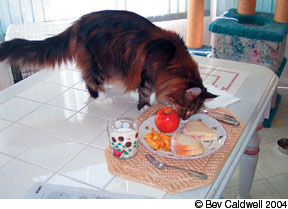Hes so quick, that cat of yours. You leave dinners leftovers on the counter for no more than a minute – and there he is, diving off the counter with a piece of chicken cacciatore locked in his jaws when you walk back into the room. Why does this happen? Is your cat a naturally born thief? Well, yes and no.
Cats are predators, says Stefanie Schwartz, DVM, MSc, a board certified veterinary behaviorist and director of behavior services at the VCA South Shore Animal Hospital in Weymouth, Massachusetts. They investigate their territory and might snatch away something that attracts them to get a closer look or a taste of something that smells good. But steal is too strong a word to describe this kind of behavior, says Dr. Schwartz, because it implies a sense of immorality or wrongdoing. Stealing is more from a human perspective, she says.
What Do Cats Like to Steal?
Not surprisingly, food is number one on a cats list. Cats have a very keen sense of smell – even stronger than that of most dogs, says Dr. Schwartz. So they will follow their noses, and most often that leads them to something delectable that their human companions have left unattended.


288
Some cats are very aggressive about taking food other than their own. These felines are on the dinner table or in the sink as soon as you leave the kitchen. Some cats will start examining the food you leave out after you unpack the groceries. Other cats will sit on the dining room table as you eat – or wait at your chair, begging.
Other cats are a little less obvious. Says Dr. Schwartz, My cat Hershel Walker sits under my daughters chair, watching for food to drop right in front of him.
But food is not the only thing that attracts cats. Cats are very intelligent, curious creatures, says Dr. Schwartz, author of Dr. Cookies Guide to Living Happily Ever After With Your Cat. They like novelty, and if there is something new in your home and it is accessible to your cat, he will want to check it out. Thats why you might notice that a new pen you left on your desk is missing for a while. The next thing you know, youll find your feline batting it around on the floor. And this may happen several times. Youll put the pen back, and your cat will knock it off again. Hopping onto your desk is very natural for a cat. Cats were made for jumping up to explore; high places are part of their territory, says Dr. Schwartz.
Scavenging for items around the house is a form of entertainment for cats, says Dr. Schwartz. Some cats like to take things away to investigate them in a more secure environment. Thats why they will walk off with certain items.
Sometimes cats are fond of chewing on certain fabrics and will whisk away items made of the material. Favorites include wool and knitted articles of clothing. Some cats will even accumulate a pile of fabric to sleep on. This is usually restricted to certain Oriental breeds, such as Siamese and Burmese, says Dr. Schwartz. Most of these cats will grow out of the habit by the time they are two to three years old.
When Pilfering Is Dangerous
Meanwhile, you may have to put away any items made of the fabric that is luring your cat or redirect his interest to other activities. Leave some other playthings around and actively play with your cat more often.
Some felines pilfering antics can be dangerous to their own health. A number of cats compulsively chew on plastic bags. And they will steal them right out of the trash. The plastic can be very dangerous if swallowed, says Dr. Schwartz. The first thing you must do is secure your trash more safely to prevent your cat from getting to something that can injure him.
Another solution is to provide a substitute for the plastic items your cat is after. Some cats like to nibble on rawhide bones, the same as dogs, says Dr. Schwartz.
Your Role in Cat Theft
Cats will be cats. Cats take food from the table and other places because their human companions tolerate their doing so, says Dr. Schwartz. If you allow your cat to sit at or on the table while you eat, you can expect your cat to try to get away with some food. And if you feed your cat table scraps when she is begging, she wont stop – and may even help herself if you dont give them to her.
If you want your cat to stop taking food, then you must change your behavior. First, dont allow your cat to join you at dinner. An excess of table food is not healthy for cats anyway. When you leave the table, put the food immediately away in the refrigerator. Dont leave food on the counter, especially uncovered. The same goes for the sink. If you leave dirty plates in the sink, dont be surprised to find your cat licking them for you.
Consistency is the rule here. Once you start restricting your cat from the table, counter or sink, keep it up.
Keep the Same Rules
Make sure all family members understand the new rules and enforce them. Your cat – being a smart, willful creature – will learn very quickly who lets him get away with jumping up on the table. Remember: When you leave food out in the open, youre inviting your cat to act like a cat. And, in most instances, he will behave that way when he gets the opportunity.
As for other feline habits – like knocking certain objects off your desk or borrowing your afghan to chew on – make sure you store these things away where your cat does not have access to them. The next trick is to make your cats home and environment as stimulating as possible so he will feel like there is always something interesting going on. Hide a few appropriate toys in some of his favorite places. Get a few interactive toys and play with your cat. This will keep him busy and looking forward to something fun and exciting.
And when you buy something new – for example, a pen for your desk – show it to your cat and even let him knock it off the desk a few times. Whats the harm in a little mischief? After all, thats why we choose to live with cats in the first place.



